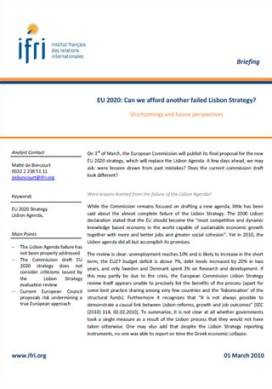EU 2020: Can we afford another failed Lisbon Strategy? Shortcomings and future perspectives

On 3rd of March, the European Commission will publish its final proposal for the new EU 2020 strategy, which will replace the Lisbon Agenda. A few days ahead, we may ask: were lessons drawn from past mistakes? Does the current commission draft look different?
While the Commission remains focused on drafting a new agenda, little has been said about the almost complete failure of the Lisbon Strategy. The 2000 Lisbon declaration stated that the EU should become the “most competitive and dynamic knowledge based economy in the world capable of sustainable economic growth together with more and better jobs and greater social cohesion”. Yet in 2010, the Lisbon agenda did all but accomplish its promises.

Available in:
Regions and themes
Share
Download the full analysis
This page contains only a summary of our work. If you would like to have access to all the information from our research on the subject, you can download the full version in PDF format.
EU 2020: Can we afford another failed Lisbon Strategy? Shortcomings and future perspectives
Related centers and programs
Discover our other research centers and programsFind out more
Discover all our analyses
China’s Strategy Toward Pacific Island countries: Countering Taiwan and Western Influence
Over the past decade, China has deployed a diplomatic strategy toward the Pacific Island Countries (PICs). This strategy pursues two main objectives: countering Taiwan's diplomatic influence in the region and countering the influence of liberal democracies in what Beijing refers to as the "Global South."

Opening up the G7 to South Korea to Address Contemporary Global Challenges
The G7’s global influence has diminished as powers like China reshape international governance through initiatives such as BRICS and the Shanghai Cooperation Organisation (SCO). With the G7 now representing just 10 per cent of the world’s population and 28 per cent of global GDP, its relevance is increasingly questioned.
Expanding SPDMM as a pivotal institution in the Pacific – A French perspective
The South Pacific Defence Ministers’ Meeting (SPDMM) is the only forum that brings together defense ministers from the wider South Pacific — including Chile, which is hosting it for the first time. This heterogeneous group of countries with varying resources, capacities, and interests — Australia, Chile, Fiji, France, New Zealand, Papua New Guinea (PNG), and Tonga — are united by their shared determination to strengthen cooperation on maritime security and humanitarian assistance and disaster relief (HADR) activities.
EU’s Derisking From China: A Daunting Task
With economic security as a major concern, the EU has recently turned to “derisking” from China. The EU strategy entails reducing critical dependencies and vulnerabilities, including in EU supply chains, and diversifying where necessary, while recognizing the importance and need to maintain open channels of communication.









